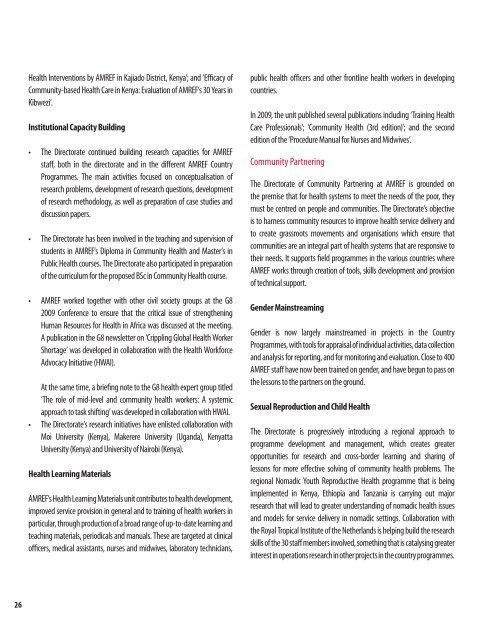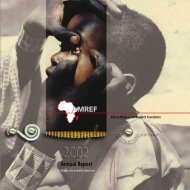Celebrating African Motherhood - Amref
Celebrating African Motherhood - Amref
Celebrating African Motherhood - Amref
Create successful ePaper yourself
Turn your PDF publications into a flip-book with our unique Google optimized e-Paper software.
26<br />
Health Interventions by AMREF in Kajiado District, Kenya’; and ‘Effi cacy of<br />
Community-based Health Care in Kenya: Evaluation of AMREF’s 30 Years in<br />
Kibwezi’.<br />
Institutional Capacity Building<br />
• The Directorate continued building research capacities for AMREF<br />
staff , both in the directorate and in the diff erent AMREF Country<br />
Programmes. The main activities focused on conceptualisation of<br />
research problems, development of research questions, development<br />
of research methodology, as well as preparation of case studies and<br />
discussion papers.<br />
• The Directorate has been involved in the teaching and supervision of<br />
students in AMREF’s Diploma in Community Health and Master’s in<br />
Public Health courses. The Directorate also participated in preparation<br />
of the curriculum for the proposed BSc in Community Health course.<br />
• AMREF worked together with other civil society groups at the G8<br />
2009 Conference to ensure that the critical issue of strengthening<br />
Human Resources for Health in Africa was discussed at the meeting.<br />
A publication in the G8 newsletter on ‘Crippling Global Health Worker<br />
Shortage’ was developed in collaboration with the Health Workforce<br />
Advocacy Initiative (HWAI).<br />
At the same time, a briefi ng note to the G8 health expert group titled<br />
‘The role of mid-level and community health workers: A systemic<br />
approach to task shifting’ was developed in collaboration with HWAI.<br />
• The Directorate’s research initiatives have enlisted collaboration with<br />
Moi University (Kenya), Makerere University (Uganda), Kenyatta<br />
University (Kenya) and University of Nairobi (Kenya).<br />
Health Learning Materials<br />
AMREF’s Health Learning Materials unit contributes to health development,<br />
improved service provision in general and to training of health workers in<br />
particular, through production of a broad range of up-to-date learning and<br />
teaching materials, periodicals and manuals. These are targeted at clinical<br />
offi cers, medical assistants, nurses and midwives, laboratory technicians,<br />
public health offi cers and other frontline health workers in developing<br />
countries.<br />
In 2009, the unit published several publications including ‘Training Health<br />
Care Professionals’; ‘Community Health (3rd edition)’; and the second<br />
edition of the ‘Procedure Manual for Nurses and Midwives’.<br />
Community Partnering<br />
The Directorate of Community Partnering at AMREF is grounded on<br />
the premise that for health systems to meet the needs of the poor, they<br />
must be centred on people and communities. The Directorate’s objective<br />
is to harness community resources to improve health service delivery and<br />
to create grassroots movements and organisations which ensure that<br />
communities are an integral part of health systems that are responsive to<br />
their needs. It supports fi eld programmes in the various countries where<br />
AMREF works through creation of tools, skills development and provision<br />
of technical support.<br />
Gender Mainstreaming<br />
Gender is now largely mainstreamed in projects in the Country<br />
Programmes, with tools for appraisal of individual activities, data collection<br />
and analysis for reporting, and for monitoring and evaluation. Close to 400<br />
AMREF staff have now been trained on gender, and have begun to pass on<br />
the lessons to the partners on the ground.<br />
Sexual Reproduction and Child Health<br />
The Directorate is progressively introducing a regional approach to<br />
programme development and management, which creates greater<br />
opportunities for research and cross-border learning and sharing of<br />
lessons for more eff ective solving of community health problems. The<br />
regional Nomadic Youth Reproductive Health programme that is being<br />
implemented in Kenya, Ethiopia and Tanzania is carrying out major<br />
research that will lead to greater understanding of nomadic health issues<br />
and models for service delivery in nomadic settings. Collaboration with<br />
the Royal Tropical Institute of the Netherlands is helping build the research<br />
skills of the 30 staff members involved, something that is catalysing greater<br />
interest in operations research in other projects in the country programmes.





